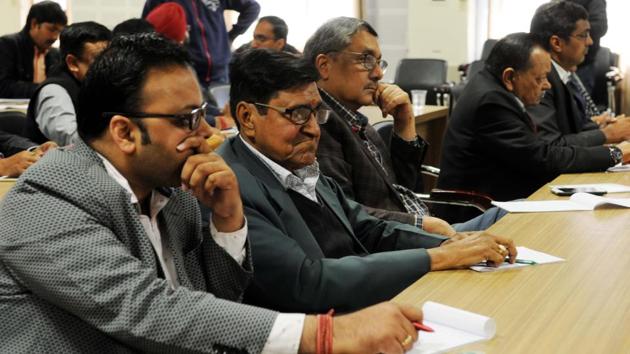Budget 2019: Govt misses fiscal deficit target, revises it upwards
The fiscal deficit for the current financial year is likely to be around 3.4% of gross domestic product (GDP), marginally higher than the targeted 3.3%.
The Interim Budget for 2019-2020 has upwardly revised the country’s fiscal deficit targets by 10 basis points for 2018-19 and 30 basis points in 2019-20 because of higher expenditure on an income support scheme targeting 120 million farm households and a pension scheme for 100 million unorganised sector workers, and an income tax rebate to 30 million taxpayers. One basis point is a hundredth of a percentage point.

The fiscal deficit for the current financial year is likely to be around 3.4% of gross domestic product (GDP), marginally higher than the targeted 3.3%.
The government has set its fiscal deficit target for 2019-20 at 3.4%, which is also higher than 3.1% of the GDP as per the fiscal roadmap envisaged earlier. The government’s earlier commitment was to reduce the fiscal deficit to 3% of GDP in 2020-21. That is now unlikely to happen.
In his budget speech, finance minister Piyush Goyal said the fiscal deficit for 2019-20 is pegged at 3.4% of GDP.
“We would have maintained fiscal deficit at 3.3% for year 2018-19 and taken further steps to consolidate fiscal deficit in year 2019-20. However, considering the need for income support to farmers we have provided Rs 20,000 crore in 2018-19 RE [revised estimate] and Rs 75,000 crore in 2019-20 BE [budget estimate]. If we exclude this, the fiscal deficit would have been less than 3.3% for 2018-19 and less than 3.1% for year 2019-20,” he said.
Goyal, however, said that the government was confident to catch the “glide path” of 3% by March 2021. “We are well within the glide path as fiscal deficit is lower than the previous year,” Subhash Chandra Garg, Secretary of Department of Economic Affairs, added.
According to Goyal, the government has been able to bring down the fiscal deficit from the high of almost 6% seven years ago to 3.4% in 2018-19.
“The current account deficit (CAD), against a high of 5.6% six years ago, is likely to be only 2.5% of GDP this year. We contained the fiscal deficit notwithstanding the Finance Commission’s recommendations increasing the share of the states from 32% to 42% in central taxes, which we accepted in the true spirit of cooperative federalism, thereby transferring significantly higher amounts to the states,” he said.
“The first instalment of the direct benefit transfer to farmers has led to the government missing the fiscal deficit target. However it has managed well to still have a target to be at 3.46% [under 3.5%] with the concerns on level of revenue realisation,” Ranen Banerjee, Partner & Leader – Public Finance and Economics, PwC India said.
Sudhir Kapadia, National Tax Leader, EY India said that against the popular belief that in an election year the budget could be populist with heavy cost to fiscal prudence, the interim finance minister managed to maintain its balance. “He seems to have managed the fiscal deficit both for 2019 as well as the next year pretty well at 3.4% of GDP despite a significant increase in expenditure of Rs 75,000 crore for the farmers income support, pension scheme for unorganised workers and a 43% jump in the personal tax rebate threshold from 3.5 lacs to 5 lacs,” he said.
“It is quite possible, though, that next year’s actual fiscal deficit may end up slightly higher at 3.5% of GDP,” he added.
Industry associations representing the country’s large companies expressed their satisfaction with a minor increase in the fiscal deficit targets for the current and next financial years.
“The budget for 2019-20 presented by Piyush Goyal has touched the right notes for stimulating demand and growth in the economy. By strongly addressing the major consuming sections of society such as farmers, the middle class and unorganized sector workers, it aims to stabilise incomes and reduce risks for vulnerable people. The Finance Minister is to be complimented for staying the course on fiscal deficit. The Budget demonstrates that good politics can translate into good economics,” Chandrajit Banerjee, Director General, Confederation of Indian Industry, said.






